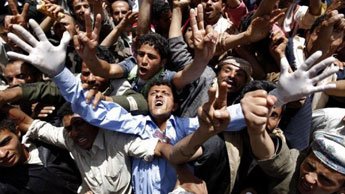News, April 2011
www.aljazeerah.info
Archives
Mission & Name
Conflict Terminology
Editorials
Gaza Holocaust
Gulf War
Isdood
Islam
News
News Photos
Opinion Editorials
US Foreign Policy (Dr. El-Najjar's Articles)
|
Editorial Note: The following news reports are summaries from original sources. They may also include corrections of Arabic names and political terminology. Comments are in parentheses. |
Protesters shot dead by security forces in Taiz
By News Wires (text)
AFP -
France 24, 04/04/2011
At least 17 protesters were killed when security forces opened fire in the Yemeni city of Taiz, south of the capital Sanaa on Monday, a medical source said.
Yemeni security forces shot dead at least 17 protesters on Monday as Gulf states offered their mediation and Washington reportedly pulled the plug on embattled President Ali Abdullah Saleh.
"The death toll has gone up to 17," said Sadeq al-Shujaa, head of a makeshift field hospital at a square in central Taez after security forces opened fire on demonstrators marching on the local governorate headquarters.
Witnesses said the demonstrators stormed the courtyard of the governorate and that plainclothes gunmen and rooftop snipers also took part in the gunfire to push them back.
The bloodshed, a day after another protester was shot dead in Taez, 200 kilometres (125 miles) from the capital, sent the death toll to more than 100 in a crackdown on protests in the impoverished state since late January.
With the rising death toll, Saleh, a longtime US ally in Washington's fight against Al-Qaeda, appears to be losing American support.
The US government is taking part in efforts to negotiate the president's departure and a transitional handover of power, according to a report in the New York Times on Sunday.
US officials have told allies they see Saleh's position as untenable due to the widespread protests, and believe he should leave office, it said. Talks on his departure had been underway for more than a week.
The talks centred on a proposal for Saleh to hand over to a provisional government under his vice-president until new polls. The principle is "not in dispute", an unnamed Yemeni official told the paper.
With the timing still to be worked out, the focus for Washington remains on keeping its Saleh-backed counter-terrorism operation in Yemen on track, the Times reported.
The Common Forum, an opposition coalition, on Saturday offered its "vision for a peaceful and secure transition of power", calling on Saleh to hand power to Vice-President Abdrabuh Mansur Hadi to head a caretaker regime.
But the president, who has adopted a defiant tone over the past week, on Sunday told the opposition to end protests and remove roadblocks, offering a "peaceful transition of power through constitutional ways".
Youth protesters staging sit-in protests, however, said they would accept nothing short of an end to Saleh's autocratic rule along with the departure of top figures in his regime.
Oil-rich Gulf states also said late on Sunday that they are seeking to mediate between Saleh and the opposition.
"The countries of the Gulf Cooperation Council have agreed to begin contacts with the Yemeni government and opposition with ideas to overcome the current situation," it said after a meeting of foreign ministers in Riyadh.
On the ground in Sanaa, soldiers from units whose commanders have sided with protesters intervened on Monday to prevent about 200 police from taking on thousands of demonstrators camped since February at a square in central Sanaa.
Yemeni President Ali Abdullah Saleh calls for a state of emergency after deadly protests
In the western city of Hudaydah, witnesses said dozens of people were wounded by police gunfire and rocks, while hundreds of others needed treatment for tear-gas inhalation.
Thirteen people were shot and wounded in Hudaydah late on Sunday, witnesses said, as police clashed with thousands of demonstrators marching on the Red Sea city's main local government building.
The demonstrations in Taez and Hudaydah form part of a renewed spurt of protests for Saleh to end his three-decade rule.
The tide appeared to turn against Saleh on March 18 when regime loyalists gunned down 52 demonstrators in Sanaa, sparking widespread condemnation abroad and a string of defections from his camp.
But boosted by two huge pro-regime rallies in the capital and previous US statements on the battle being waged against al-Qaeda in Yemen under its ally Saleh have produced shows of defiance by the president.
YEMEN Anti-regime protests turn deadly after Yemeni police open fire
YEMEN Rival camps stage mass rallies in Yemeni capital
YEMEN President vows to stay the course

Two men died and hundreds more were injured when Yemeni police fired live rounds and tear gas to disperse an anti-government protest in the city of Taez, witnesses said.
Two Yemenis died and hundreds were hurt on Sunday when police used live rounds, tear gas and batons to try to break up protests against President Ali Abdullah Saleh, who called for an end to weeks of unrest.

Fair Use Notice
This site contains copyrighted material the use of which has not always been specifically authorized by the copyright owner. We are making such material available in our efforts to advance understanding of environmental, political, human rights, economic, democracy, scientific, and social justice issues, etc. We believe this constitutes a 'fair use' of any such copyrighted material as provided for in section 107 of the US Copyright Law. In accordance with Title 17 U.S.C. Section 107, the material on this site is distributed without profit to those who have expressed a prior interest in receiving the included information for research and educational purposes. For more information go to: http://www.law.cornell.edu/uscode/17/107.shtml. If you wish to use copyrighted material from this site for purposes of your own that go beyond 'fair use', you must obtain permission from the copyright owner.
|
|
|
|
||
|
||||||


